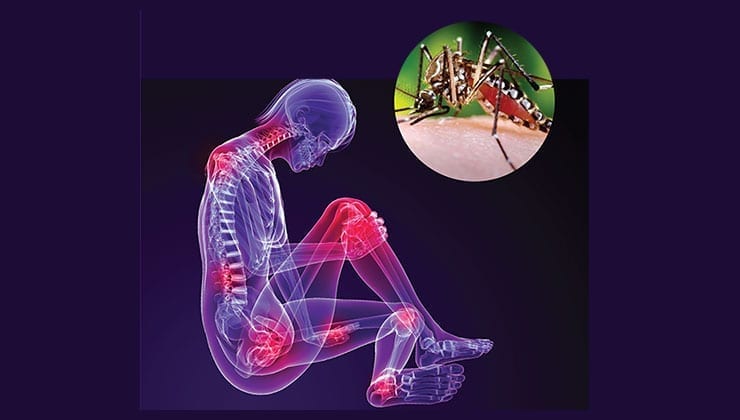Researchers at Washington University School of Medicine in St. Louis have found that blood tests of patients with the Chikungunya virus and those with rheumatoid arthritis can produce similar results. Combined with some overlapping symptoms, this may lead some patients with the virus to be misdiagnosed.
The findings, reported in the January issue of Arthritis and Rheumatology, underscore the need for doctors to obtain detailed travel and medical histories from patients being evaluated for rheumatoid arthritis. Such details could help distinguish between the two conditions.
“For now, good travel histories of patients are among the best diagnostic tools for physicians,” said senior author Wayne Yokoyama, MD, the Sam and Audrey Loew Levin Professor of Medicine. “Recent travel to the Caribbean, Central and South America, Africa, India or other areas where the virus is prevalent should raise suspicions of Chikungunya infection. In addition, the disease typically starts with high fever and abrupt onset of severe pain in the joints, which are not usually seen with rheumatoid arthritis.”
The global spread of the Chickungunya virus suggests that the disease is likely to be a diagnostic challenge in the years ahead. Physicians treat rheumatoid arthritis with drugs that suppress the immune system, but it’s not yet known whether that approach will help or harm patients with Chikungunya virus.
The virus is spread by infected mosquitoes and first was identified 60 years ago in eastern Africa. Since then, it has spread to many parts of the world.
In 2014, more than 2,000 people in the United States developed the infection after traveling abroad, mostly to the Caribbean. That same year, the Centers for Disease Control and Prevention reported 11 cases of Chikungunya infection among people living in Florida who had not traveled outside the United States, suggesting that mosquitoes in that state were spreading the virus.
In most patients, the infection causes a fever, rash and severe joint pain in the hands, feet, knees, neck and elbows. The fever and rash typically subside in seven to 10 days, but symptoms of arthritis may persist for 12-15 months in up to 60 percent of patients. Some patients’ symptoms persist for up to three years.
For the study, lead author Jonathan Miner, MD, PhD, a rheumatology fellow, studied 10 St. Louis-area residents who traveled in June 2014 to Haiti, where they were infected with Chikungunya virus. The patients were evaluated seven to 10 weeks after the onset of symptoms. During that time, eight patients developed persistent arthritis, several with joint pain so severe they had difficulty walking.
“All eight patients with Chikungunya-related arthritis met the American College of Rheumatology’s criteria for a diagnosis of rheumatoid arthritis,” Miner said. “Their recent travel to Haiti led us to suspect they had Chikungunya virus infections.”
As a comparison, the study also included healthy subjects and patients newly diagnosed with rheumatoid arthritis who had not yet received treatment.
Laboratory tests that measured levels of specialized immune cells in the blood showed additional similarities between Chikungunya virus infection and rheumatoid arthritis, including elevated levels of specialized T cells, which suggest, despite the persistence of symptoms, that the immune system has recognized and is fighting the virus. These studies were performed on state-of-the-art instruments in the university’s newly established Center for Human Immunology and Immunotherapy Programs.
To positively identify Chikungunya virus, the researchers performed highly specialized tests of the immune system, with results that showed antibodies against the Chikungunya virus in patients’ blood. Such testing is only available at the CDC and in research laboratories.
According to Yokoyama, a Howard Hughes Medical Institute investigator, the similarities between Chikungunya virus infection and rheumatoid arthritis suggest that learning more about the virus may help scientists better understand rheumatoid arthritis, which affects about one in every 100 people worldwide.
Said co-author Deborah Lenschow, MD, PhD, associate professor of medicine and of pathology and immunology: “We’re anticipating that Chikungunya virus will spread broadly in the United States, so it’s important to develop better tools for diagnosis, prevention and treatment.”
The researchers also have established a Chikungunya registry to build a database of cases for studying the virus in more detail.
Read the study: Chikungunya viral arthritis in the United States: A mimic of seronegative rheumatoid arthritis.



